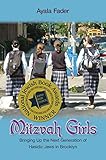Mitzvah Girls : Bringing Up the Next Generation of Hasidic Jews in Brooklyn / Ayala Fader.
Material type: TextPublisher: Princeton, NJ : Princeton University Press, [2009]Copyright date: ©2009Description: 1 online resource (280 p.) : 8 halftones. 1 tableContent type:
TextPublisher: Princeton, NJ : Princeton University Press, [2009]Copyright date: ©2009Description: 1 online resource (280 p.) : 8 halftones. 1 tableContent type: - 9780691139166
- 9781400830992
- Hasidim -- New York (State) -- New York -- Conduct of life
- Jewish girls -- New York (State) -- New York -- Conduct of life
- Jewish religious education of girls -- New York (State) -- New York
- Jewish women -- New York (State) -- New York -- Conduct of life
- SOCIAL SCIENCE / Anthropology / Cultural & Social
- 296.8/3320820974723 22
- online - DeGruyter
- Issued also in print.
| Item type | Current library | Call number | URL | Status | Notes | Barcode | |
|---|---|---|---|---|---|---|---|
 eBook
eBook
|
Biblioteca "Angelicum" Pont. Univ. S.Tommaso d'Aquino Nuvola online | online - DeGruyter (Browse shelf(Opens below)) | Online access | Not for loan (Accesso limitato) | Accesso per gli utenti autorizzati / Access for authorized users | (dgr)9781400830992 |
Browsing Biblioteca "Angelicum" Pont. Univ. S.Tommaso d'Aquino shelves, Shelving location: Nuvola online Close shelf browser (Hides shelf browser)
Frontmatter -- Contents -- Acknowledgments -- Notes on Yiddish and Transcription Conventions -- CHAPTER ONE. Introduction -- CHAPTER TWO. Fitting In -- CHAPTER THREE. Defiance -- CHAPTER FOUR. Making English Jewish -- CHAPTER FIVE. With It, Not Modern -- CHAPTER SIX. Ticket to Eden -- CHAPTER SEVEN. Becoming Hasidic Wives -- Coda -- Notes -- Glossary -- References -- Index
restricted access online access with authorization star
http://purl.org/coar/access_right/c_16ec
Mitzvah Girls is the first book about bringing up Hasidic Jewish girls in North America, providing an in-depth look into a closed community. Ayala Fader examines language, gender, and the body from infancy to adulthood, showing how Hasidic girls in Brooklyn become women responsible for rearing the next generation of nonliberal Jewish believers. To uncover how girls learn the practices of Hasidic Judaism, Fader looks beyond the synagogue to everyday talk in the context of homes, classrooms, and city streets. Hasidic women complicate stereotypes of nonliberal religious women by collapsing distinctions between the religious and the secular. In this innovative book, Fader demonstrates that contemporary Hasidic femininity requires women and girls to engage with the secular world around them, protecting Hasidic men and boys who study the Torah. Even as Hasidic religious observance has become more stringent, Hasidic girls have unexpectedly become more fluent in secular modernity. They are fluent Yiddish speakers but switch to English as they grow older; they are increasingly modest but also fashionable; they read fiction and play games like those of mainstream American children but theirs have Orthodox Jewish messages; and they attend private Hasidic schools that freely adapt from North American public and parochial models. Investigating how Hasidic women and girls conceptualize the religious, the secular, and the modern, Mitzvah Girls offers exciting new insights into cultural production and change in nonliberal religious communities.
Issued also in print.
Mode of access: Internet via World Wide Web.
In English.
Description based on online resource; title from PDF title page (publisher's Web site, viewed 30. Aug 2021)









